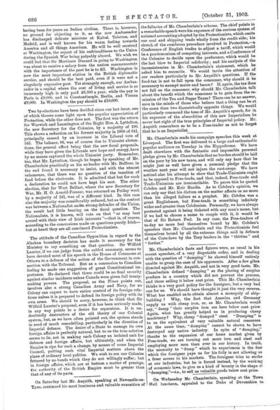The attitude of the Canadian Opposition in regard to the
Alaskan boundary decision has made it necessary for the Ministry to say something on that question. Sir Wilfrid Laurier, if we can judge from the cabled summary, seems to have devoted most of his speech in the House of Commons at Ottawa to a defence of the action of the Government in con- nection with the Tribunal. But as a concession to Canadian feeling he made one suggestion of great Constitutional im- portance. He declared that there could be no final security against similar incidents unless Canada were given full treaty- making powers. The proposal, as the Times points out, involves also a strong Canadian Army and Navy, for no Colony can expect to have entire control of its foreign rela- tions unless it is prepared to defend its foreign policy with its own arms. We should be sorry, however, to think that Sir Wilfrid Laurier's proposal, even if it has been seriously made, in any way points to a desire for separation. It is un- doubtedly destructive of the old theory of our Colonial system, but, as we have often pointed out, the system stands in need of much remodelling, particularly in the direction of Imperial defence. The desire of a State to manage its own foreign affairs is perfectly natural, but to us the true solution seems to lie, not in making each Colony an isolated unit for defence and foreign affairs, but ultimately, and when the Empire is ripe for such a change, by means of some Imperial Council. putting such vital Imperial matters above the plane of ordinary local politics. We wish to see our Colonies fettered by no bonds which they do not willingly suffer; but in foreign affairs, which are at bottom a matter of prestige, the authority of the British Empire must be greater than that of any of its parts.


















































 Previous page
Previous page